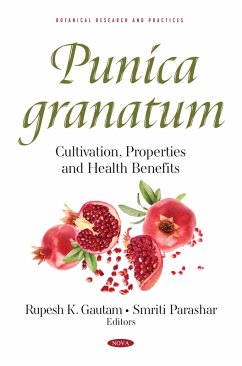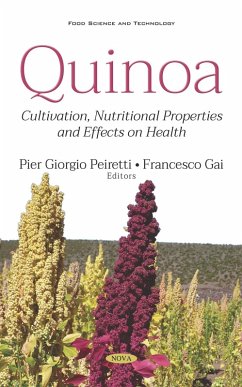
Punica granatum: Cultivation, Properties and Health Benefits (eBook, PDF)

PAYBACK Punkte
106 °P sammeln!
Pomegranate (Punica granatum L.) is an ancient fruit estimated to be introduced to human cultures around the world about 4000 years ago. It is native to Central Asia, from Iran and Turkmenistan to northern India regions, and is widely cultivated in Mediterranean, tropical and subtropical regions. The highest-quality pomegranate is grown in arid zones because it is tolerant to drought conditions. It is well known to humans for its nutritional, curative, and ornamental values. About 75% of individuals from developed countries use pomegranate in traditional medicine. Punica granatum: Cultivation,...
Pomegranate (Punica granatum L.) is an ancient fruit estimated to be introduced to human cultures around the world about 4000 years ago. It is native to Central Asia, from Iran and Turkmenistan to northern India regions, and is widely cultivated in Mediterranean, tropical and subtropical regions. The highest-quality pomegranate is grown in arid zones because it is tolerant to drought conditions. It is well known to humans for its nutritional, curative, and ornamental values. About 75% of individuals from developed countries use pomegranate in traditional medicine. Punica granatum: Cultivation, Properties and Health Benefits is an attempt to bring together important research work, literature, and scientific findings regarding Punica granatum L. This book aims to feature the medicinal importance of this plant and its journey from folk medicine to modern medicine. This book compiles various medical studies of pomegranate for treatment of cancer, Alzheimer''s disease, diabetes, cardiovascular disorders, bacterial infections, ischemia, male infertility, arthritis, obesity, and skin diseases. It is reported to have antioxidant, antimicrobial, anti-diabetic, anti-cancer, and anti-inflammatory properties. The use of pomegranate as a natural source of medicine has steadily increased around the world in recent years.
Dieser Download kann aus rechtlichen Gründen nur mit Rechnungsadresse in A, B, BG, CY, CZ, D, DK, EW, E, FIN, F, GR, HR, H, IRL, I, LT, L, LR, M, NL, PL, P, R, S, SLO, SK ausgeliefert werden.













